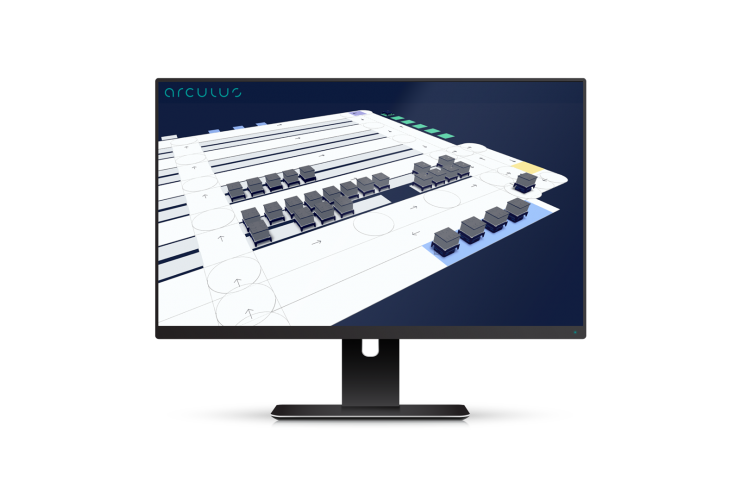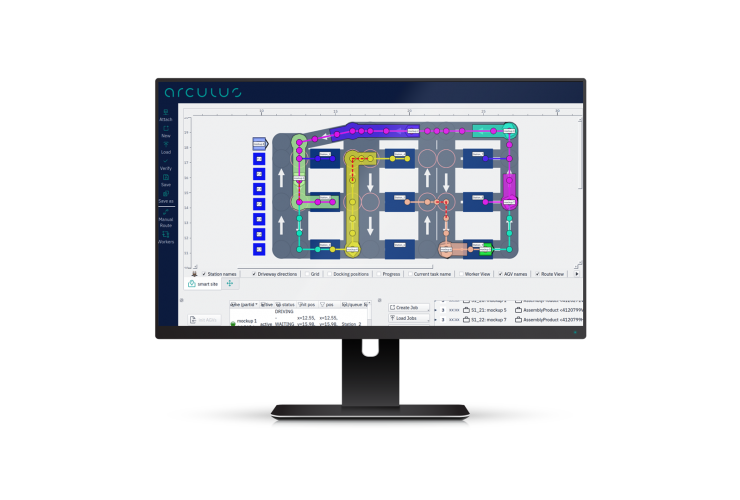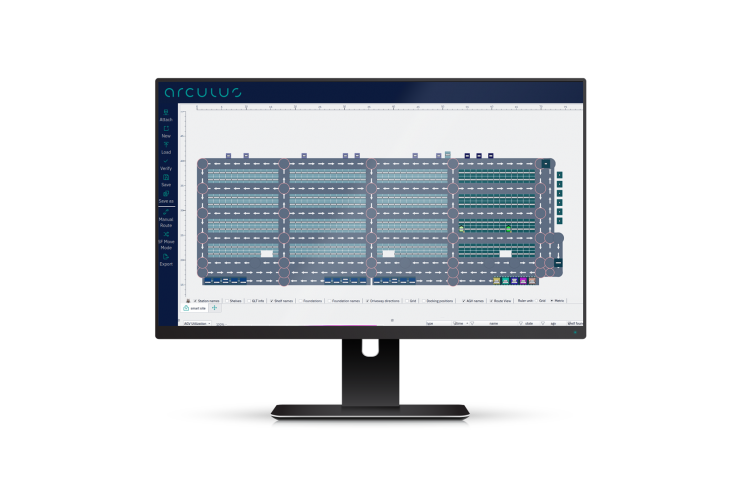IFOY Schirmherrschaft
IFOY Träger
IFOY Partner
arculus Fleet
arculus GmbH
IFOY-Kategorie
Intralogistics Software
Zusammenfassung
arculus Fleet ist ein herstellerübergreifendes Flottenmanagementsystem. Es ermöglicht dem Kunden via VDA5050-Schnittstelle den Betrieb von AGVs verschiedener Hersteller auf der gleichen Fläche. Kernfunktionen sind die Planung und Optimierung von Layouts, die Hüllkurven basierte Verkehrssteuerung, sowie die prädiktive Pfadplanung. Als Teil des arculus Modular Production System kann arculus Fleet sowohl stand-alone, als auch in Kombination mit arculus Warehouse (Ware-zur-Person-Logistik) oder arculus Modular Production (dynamischer Produktfluss) implementiert werden.
Beschreibung
arculus Fleet steuert, unabhängig von der Navigationstechnologie, Kinematik und Dimension des AGVs, unterschiedliche Flotten mithilfe der VDA5050-Schnittstelle in jeder innerbetrieblichen Industrieumgebung.
arculus Fleet beinhaltet alle drei Implementierungsphasen:
- Planung und Layout (Build)
- Simulation (Simulate)
- Betrieb (Operate)
Im Build Modus werden alle notwendigen Objekte konfiguriert:
- Fahrstraßen (mit Fahrtrichtung, Geschwindigkeitsbegrenzungen)
- Flotten von FTS-Fahrzeugen (Abmessung, Brems-/ Beschleunigungsbegrenzungen, kompatible Unterfahrtische, Energieverbrauch)
- Transportobjekte (Abmessungen, Ausrichtung)
- Kommunikation mit automatisierten Anlagen (automatische Stationen, Rolltore, Ladestationen).
Im Simulationsmodus kann das Layout mithilfe von realitätsnahen Transportaufträgen verifiziert werden. Mit KPIs wie Transportzeiten und AGV-Auslastung sowie verschiedener Heatmaps können die geplanten Layouts ausgewertet und analysiert werden. Das optimierte Layout kann ohne weitere Anpassungen für den Betrieb verwendet werden. Während des Betriebs sind bestimmte Bediener- und Managementansichten (2D/3D-Layout, Fehlerbehebung, Auftragslisten) verfügbar und ermöglichen eine intuitive und robuste Bedienung sowie Verwaltung des Systems.
Bewerbungsdaten
Innovation
Die Hauptdifferenzierungsmerkmale des arculus Fleet sind:
- Offene Schnittstelle (VDA5050) zur Integration von AGVs/AMRs unterschiedlicher Hersteller
- Dynamische Pfadplanung auf Basis von Echtzeit-Verkehrsinformationen
- Vertikale Integration des Flottenmanagement mit arculus Warehouse (Ware-zu-Person) und arculus Modular Production (intelligenter Produktfluss)
arculus war Teil des VDA- und VDMA-Expertengremiums zur Standardisierung der AGV-Schnittstelle und verfügt über ein tiefes Verständnis in der Robotik. VDA5050 und das Verständnis aus der Robotik ermöglichen eine schnelle Integration und Inbetriebnahme neuer Anbieter. Anwendungsfälle mit Flotten mehrerer Anbieter ermöglichen Effizienzgewinne und eine höhere Wirtschaftlichkeit.
Die dynamische Pfadplanung kann mit Navigationssystemen wie Google Maps verglichen werden. Quelle-Senke-Beziehungen werden nicht mehr vorgegeben, sondern während der Laufzeit berechnet. Quellen und Senken werden mit Fahrstraßen verbunden, was es dem Algorithmus ermöglicht, den optimalen Pfad entsprechend der aktuellen Verkehrssituation zu berechnen.
Aufgrund der vertikalen Integration des Flottenmanagements beschränken sich die Anwendungsfälle nicht nur auf den Materialtransport (beispielsweise die Materialversorgung vom Lager an eine Montagelinie), sondern können auch um Ware-zur-Person- und modulare Produktionsanwendungen erweitert werden.
Marktrelevanz
arculus Fleet ist ein vielseitiges System für Logistik- und Produktionsanwendungen über alle Branchen hinweg und adressiert damit den 30 Mrd. US-Dollar umfassenden Lagerautomatisierungsmarkt. Immer mehr Kunden suchen nach einem generischen Flottenmanagement, statt proprietäre Lösungen für jede Flotte zu betreiben.
arculus Fleet ist bereits bei Kunden wie AUDI im Produktionsbetrieb im Einsatz (https://www.audi-mediacenter.com/de/pressemitteilungen/innovationssprung-in-der-logistikaudi-entwickelt-ersten-supermarkt-20-fuer-die-automobilindustrie-12950) und ermöglicht Effizienzgewinne und Platzersparnisse zu erzielen.
Wettbewerber:
- Synaos GmbH (syna.os logistics)
- Siemens AG (simove)
Hauptvorteile für den Kunden
- Intelligente Routenplanung auf Basis von Echtzeit-Verkehrsinformationen
- Prädiktive Pfadplanung zur Vermeidung von Staus
- Verkehrssteuerung auf Basis von dynamisch erzeugten Hüllkurven für jeden AMR
- Planung, Simulation, Betrieb und Optimierung aus einem Software System
- Dezidierte Ansicht für den Betrieb, die Wartung und das Management des Systems
- 2D-/ 3D-Visualisierung und Überwachung sowie anwenderspezifische Berichte
- Basismodul für Ware-zu-Person-Anwendungen und die modulare Produktion
Technische Daten
IFOY Test
| Name | ARCULUS, arculus Fleet |
| Category | Intralogistics Software |
| Date of Test | 22.-26. März 2021 |
Testbericht
Mit arculus Fleet präsentiert arculus ein herstellerübergreifendes Flottenmanagementsystem für FTS. Das System ermöglicht es, autonome Fahrzeuge verschiedener Anbieter im gleichen Raum einzusetzen - unabhängig von der Navigationstechnologie, den kinematischen Eigenschaften und den Abmessungen der FTS. Basis ist die standardisierte VDA5050-Schnittstelle.
arculus Fleet ist Teil des arculus Modular Production System und kann mit arculus Warehouse (für Ware-zur-Person-Logistik) oder arculus Modular Productiuon (für dynamischen Warenfluss) eingesetzt werden. Das System kann auch als Stand-alone-Lösung implementiert werden. Die Funktionalitäten sind unabhängig von der genannten Auswahl immer gleich.
Neben der Gestaltung und Optimierung von Layouts ermöglicht arculus Fleet eine dynamische Routenplanung auf Basis der aktuellen Verkehrssituation. Intelligentes Verkehrsmanagement ist ebenfalls eine der Kernaufgaben des Systems.
Dazu müssen zunächst alle notwendigen (Umgebungs-)Objekte konfiguriert werden (im Build-Modus). Diese umfassen Fahranweisungen und Geschwindigkeitsbegrenzungen, aber auch Abmessungen, Beschleunigungs- und Bremsvermögen, Energieverbrauch, Abmessungen und Ausrichtung der zu transportierenden Lasten, eventuelle Rolltore, Ladestationen usw. Im Anschluss wird das Layout im Simulationsmodus verifiziert, woraufhin alle wichtigen KPIs abgeleitet werden können, darunter unter anderem Transportzeiten, FTS-Auslastung und mögliche Verkehrsengpässe. Das optimierte Layout kann unmittelbar zur Bedienung der Anlage verwendet werden.
Im Betriebsmodus sind spezifische Betriebs- und Verwaltungsinformationen verfügbar, die eine intuitive Bedienung und Verwaltung des Systems ermöglichen.
IFOY Testfazit:
Die Verwendung einer standardisierten Schnittstelle öffnet Möglichkeiten für den Mischbetrieb von automatisierten Lagerfahrzeugen, die bis vor kurzem in der Praxis noch undenkbar waren. Die Tatsache, dass arculus Fleet markenunabhängig ist, erleichtert die Auswahl des am besten geeigneten FTS für eine bestimmte Transportanforderung. Da das System die aktuelle Verkehrssituation vor Ort für das dynamische Routing berücksichtigt, ist eine noch höhere Effizienz und Verfügbarkeit möglich.
IFOY Innovation Check
IFOY Innovation Check
Marktrelevanz
Das Tool ist ein herstellerübergreifendes Managementsystem (Leitsteuerung) für Transportsysteme. Wegen der Vielzahl an Automatiklösungen im Transportbereich ist das System von sehr hoher Relevanz.
Kundennutzen
Beim Einsatz von mehreren Transportsystemen in einer Umgebung kann die Anbindung der Transportsysteme an das ERP-System herstellerneutral die gesamte Auftrags- und Verkehrssteuerung übernehmen.
Neuheitsgrad
Bei vorhandenen Schnittstellen (VDA) kann hier eine Lösung für unterschiedliche Anbindungen verwendet werden.
Funktionalität / Art der Umsetzung
Das Tool ist grafisch nicht sehr aufwendig gestaltet, wurde aber gut nutzbar umgesetzt. Es ist herstellerübergreifend konzipiert worden und optimiert somit das Gesamtsystem. Das System widerspricht scheinbar dem Ziel der Dezentralisierung, aber für eine gewisse Zeit ist es sicher sinnvoll. Ein Nachteil: Schnittstellen müssen vorhanden sein oder aufwändig programmiert werden.
|
Marktrelevanz |
++ |
|
Kundennutzen |
+ |
|
Neuheits- / Innovationsgrad |
Ø |
|
Funktionalität / Art der Umsetzung |
Ø |
|
++ sehr gut / + gut / Ø ausgeglichen / - weniger / - - nicht vorhanden |
|
arculus Fleet
arculus GmbH
IFOY category
Intralogistics Software
Summary
arculus Fleet is a multi vendor fleet management system. It enables customers to operate AGVs from different vendors in the same space via the standardised VDA5050 interface. Core features are the design and optimisation of layouts, envelope based intelligent traffic management, and traffic based dynamic path planning. As part of the arculus Modular Production System, it can be implemented as a standalone solution or in combination with arculus Warehouse (goods-to-person logistics) or arculus Modular Production (dynamic product flow).
Description
arculus Fleet can be used in any inhouse industrial environment for traffic management of any AGV, regardless of its navigation technology, kinematic and dimension. arculus Fleet communicates via the industry-standard VDA5050 interface.
It covers three different processes:
- Plan and layout (Build)
- Simulation (Simulate)
- Operation (Operate)
In Build mode, all necessary objects are configured:
- Driveways (including directions and speed limits)
- Fleets of AGVs (with dimensions, brake/ acceleration limits, compatible carriers, energy consumption)
- Transport objects (dimensions, orientations)
- Machinery interaction (automatic stations, roller doors, charging stations)
In Simulation mode, the layout can be verified via representative transport orders, deriving KPIs such as transport times, AGV utilisation, and traffic heatmaps. The optimised layout can be used directly to operate the system.
During Operation mode, designated operator and management views (2D/3D layout, error recovery, job lists) are available and allow an intuitive and robust operation and management of the system.
Entry Data
Innovation
The main differentiators of arculus Fleet are:
- An open interface for integration of any AGV/AMR via VDA5050
- Dynamic path planning based on live traffic information
- Vertical integration with arculus Warehouse Management (goods to person) and arculus Modular Production (dynamic product flow)
arculus has been part of the VDA and VDMA activity for standardising the AGV interface and has a deep understanding of robotics. This allows for fast integration and onboarding of new vendors. Mixed use-cases with fleets of multiple vendors will allow for efficiency gains and optimised economics.
Dynamic path planning works like navigation systems such as Google Maps. Source-sink relationships are no longer predetermined but calculated at runtime. Sources and sinks are connected to driveways, allowing the traffic management algorithm to derive the optimal path according to the current traffic in the system.
Due to the vertical integration, use cases are not limited to material handling (i.e., delivering material from a warehouse to an assembly line). Goods-to-person logistics and modular production functionality can be added while still using the same fleet management.
Marktet relevance
arculus Fleet is a versatile system for use cases across all verticals, thus addressing the warehouse automation market of 30 Billion US-Dollar. More and more customers are looking for generic fleet management instead of operating proprietary solutions for each fleet. The arculus Fleet is operated live at customers such as AUDI (https://www.audi-mediacenter.com/de/pressemitteilungen/innovationssprung-in-der-logistikaudi-entwickelt-ersten-supermarkt-20-fuer-die-automobilindustrie-12950) helping to generate efficiency gains and space savings.
Competitors:
- Synaos GmbH (syna.os logistics)
- Siemens AG (simove)
Main customer benefits
- Smart routing and re-routing based on live traffic information
- Predictive path planning to prevent the risk of congestion
- Traffic control based on dynamic trajectory envelopes for each AMR
- Planning, simulation, operation, and optimization in one system
- Dedicated views for operators, servicing and management
- 2D/3D visualization and monitoring, customized reports
- Core module for goods-to-person and modular production
Technical data
IFOY Test
| Name | ARCULUS, arculus Fleet |
| Category | Intralogistics Software |
| Date of Test | March 22 to March 26, 2021 |
Test Report
With arculus Fleet, arculus presents a manufacturer-independent fleet management system for AGVs. The system makes it possible to use autonomous vehicles from different suppliers in the same space, regardless of the navigation technology, the kinematic properties and the dimensions of the AGVs. The basis is the standardised VDA5050 interface.
arculus Fleet is part of the arculus Modular Production System and can be used with arculus Warehouse (for goods-to-person logistics) or arculus Modular Productiuon (for dynamic flow of goods). The system can also be implemented as a stand-alone solution. The functionalities are always the same regardless of the selection mentioned.
Besides the design and optimisation of layouts, arculus Fleet enables dynamic route planning based on the current traffic situation. Intelligent traffic management is also one of the core tasks of the system. For this, all necessary objects must first be configured (in build mode). These include driving instructions and speed limits, but also dimensions, acceleration and braking capacity, energy consumption, dimensions and orientation of the loads to be transported, any rolling gates, loading stations, etc. Subsequently, the layout is verified in simulation mode, whereupon all important KPIs can be derived, including transport times, AGV utilisation and possible traffic bottlenecks, among others. The optimised layout can be used immediately to operate the plant.
In operation mode, specific operational and management information is available, enabling intuitive operation and management of the system.
IFOY Test Verdict
The use of a standardised interface opens up possibilities for the mixed operation of automated warehouse vehicles that were unthinkable in practice until recently. The fact that arculus Fleet is brand-independent facilitates the selection of the most suitable AGV for a specific transport requirement. Since the system takes into account the current traffic situation on site for dynamic routings, even higher efficiency and availability is possible.
IFOY Innovation Check
IFOY Innovation Check
Market relevance
The tool is a manufacturer-independent management system (master control) for transport systems. Due to the large number of automated solutions in the transport sector, the system is of very high relevance.
Customer benefit
When using several transport systems in one environment, the connection of the transport systems to the ERP system can take over the entire order and traffic control in a manufacturer-neutral manner.
Novelty
With existing interfaces (VDA), one solution can be used for different connections..
Functionality / type of implementation
The tool is not very elaborately designed graphically, but has been implemented in a way that is easy to use. It has been designed to be manufacturer-independent and thus optimises the overall system. The system seems to contradict the goal of decentralisation, but for a certain time it is certainly useful. One disadvantage: interfaces must be available or programmed in an elaborate way.
|
Market relevance |
++ |
|
Customer benefit |
+ |
|
Degree of novelty / innovation |
Ø |
|
Functionality / Type of implementation |
Ø |
|
++ very good / + good / Ø balanced / - less / - - not available |
|
















